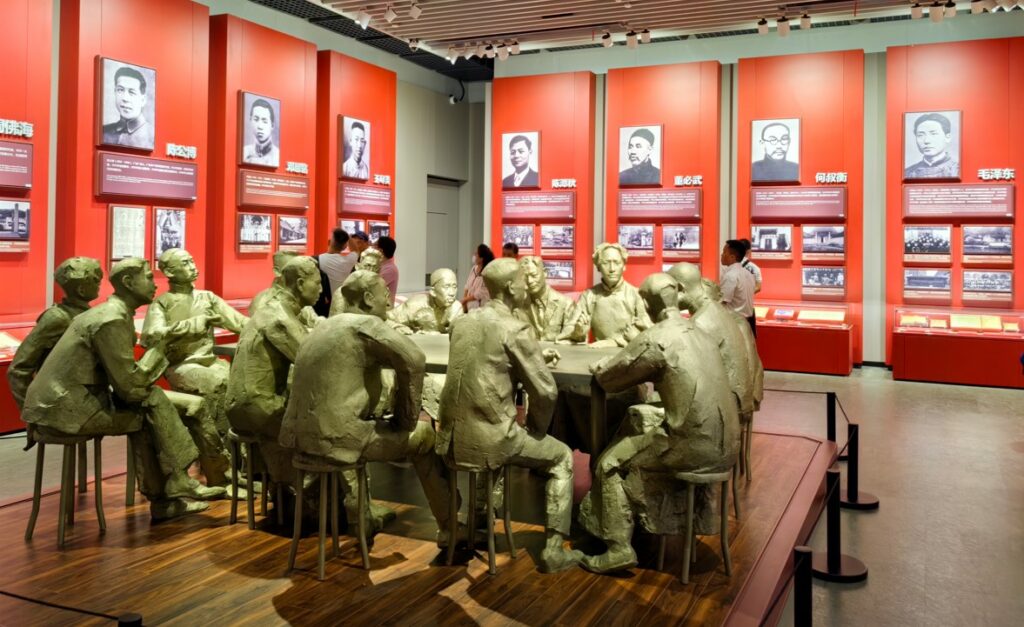Views: 288
Exploring modern perspectives beyond historical preconceptions
Frans Vandenbosch 方腾波 30.07.2024

Communism, good or bad ?
The answer to that question entirely depends on the definition of “Communism”. Do you define Communism as it is commonly defined as in the Western mainstream media ? Do you define Communism as it was in the USSR or DDR ? How do you define Communism as it is applied nowadays in China ? What is YOUR definition of communism ?
After all, let’s not focus on perceptions or get bogged down in definitions, let’s focus on the practical results.
Communism in China
The ideological framework of the People’s Republic of China (PRC) is focusing on the progression from socialism to an ideal communist society. According to the official doctrine, this transition is facilitated through “scientific socialism,” a systematic approach that contrasts with “utopian socialism,” which is seen as unrealistic. The better translation for PRC (People’s Republic of China) is “The Commonwealth of the Peoples of the Splendid Central Civilization.” It advocates for the creation of Devoted Aristocratic Oligarchies (DAO) for each nation, emphasizing the values of truth, goodness, beauty, justice, humanity, valour, and wisdom.
The Kakistocratic Feudal Conglomerate associated with the Anglo-Zio-American establishment, is unable to deal with a “live and let live” philosophy.[1]
Sino-Soviet relations
Russia and China didn’t always see eye to eye.
The Sino-Russian border conflicts (1652–1689) saw skirmishes between Russia’s Cossacks and China’s Qing dynasty, aided by Korea. Russia’s failed attempts to claim land north of the Amur River led to the Treaty of Nerchinsk in 1689, where Russia conceded the region to China.
Nearly two centuries later, in 1858, with the Qing Dynasty weakened, Russia seized land between the Stanovoy Range and the Amur with the Treaty of Aigun. In 1860, the Convention of Beijing extended Russian control to Hǎishēnwǎi (Vladivostok), a new acquisition.
The Sino-Soviet conflict of 1929 involved clashes over the Chinese Eastern Railway between the Soviet Union and Chinese warlord Zhang Xueliang.
Relations soured dramatically from 1961 to 1986 due to ideological splits during the Cold War. Disagreements over Marxism–Leninism and Soviet policies led Mao Zedong to denounce Soviet communism. Tensions peaked with the 1969 Sino-Soviet border conflict near Damansky Island and in Xinjiang.
Ideological differences provoked the PRC’s formal denunciation of Soviet communism as the work of revisionist traitors in the USSR. As a consequence, in the following decade, under the leadership of Zhou Enlai, all leaders of Western Communist parties were gradually banned from attending the Chinese People’s Congress as observers.
With the Soviet Union’s fall, China and Russia began mending ties. By 1992, they pursued a “constructive partnership,” evolving to a “strategic partnership” by 1996. Their Treaty of Friendship and Cooperation came in 2001, and Xi Jinping’s 2013 visit to Moscow solidified a special relationship between China and Russia.
Democracy in America
Alexis de Tocqueville in “De la démocratie en Amérique” (1835) perceived the effects of accretion of bureaucratic rules and countless laws regulating everything. Two centuries ago, de Tocqueville predicted that the American society would fall into a new kind of servitude where the ruling authority, “covers the surface of society with a network of small, complicated rules,” in a process which “does not tyrannise but compresses, enervates, extinguishes and stupefies people, till each nation is reduced to be nothing better than a flock of timid and industrious animals of which the government is the shepherd.” [2]
Wáng Hùníng, chairman of the CPPCC (Chinese People’s Political Consultative Conference) in his ” America against America ” (1991) wrote along the same lines. [3]
Kishore Mahbubani recently said that “The insularity of the American discourse is actually frightening… There’s an incestuous self-referential discourse among these journalists.” He goes on to add: “the era of western domination of world history was a 200-year aberration. It’s coming to an end.”[4]
Johann Wolfgang von Goethe: in “Faust” (1790)
Niemand ist so hoffnungslos versklavt wie diejenigen, die fälschlicherweise glauben, sie seien frei.
Goethe’s Faust is his magnum opus and the greatest work of German literature.
Goethe’s Faust is Xi Jinping’s guideline; he knows the book inside and out. No wonder that Xi Jinping is the most formidable rival the West has ever encountered because he’s a true aristocratic man of the highest order, surrounded by aristocratic men of the highest order acknowledging him as primus inter pares and endowed with a state apparatus built through many ordeals since 1921, united by a common goal they stated crystal clear: restoring China’s glory. [5] “Aristocratic” as in the old Greak meaning, as explained in “The tyranny of the Geniusses” [6]
China is growing towards more, not less Communism
The Chinese government’s ongoing efforts are to uphold and promote communist ideology and principles in the country. The Chinese government under the leadership of the Communist Party of China (CPC) is actively working to strengthen the role of the party in all aspects of society, including the economy, culture, and governance.
This can be seen in the government’s initiatives to promote socialist core values and reinforce the party’s leadership in various sectors. Additionally, the CPC’s emphasis on implementation of socialist policies reflect a commitment to preserving and enhancing communist ideals in China.
Furthermore, the Chinese perspective may highlight the continued relevance and significance of communist ideology in shaping domestic policies and international relations. The government’s emphasis on building a “moderately prosperous society” and achieving the “Chinese Dream” aligns with the principles of communism, emphasizing the pursuit of common prosperity and national rejuvenation.
Overall, this implies that China is actively advancing towards a more ideologically pure form of communism, as envisioned by the CPC, rather than moving away from it. This aligns with the government’s objective of strengthening socialism with Chinese characteristics and achieving the great rejuvenation of the Chinese nation under communist leadership.
Communism in former Yugoslavia, compared to current China
In Alex Krainer’s article “The meaning of freedom and security“, he reflects on the former Yugoslavia’s communist system, noting its simplicity, economic stability, and minimal restrictions, all contributing to a high quality of life. He contrasts this with the current more regulated and often stressful conditions in the West.
Krainer advocates for assessing governance systems based on actual outcomes rather than ideological labels. He also highlights China’s achievements in poverty reduction and infrastructure development, stating that China’s model includes significant personal and democratic freedoms, challenging common Western perceptions.[7]
Wrap-up
The perception of communism varies greatly depending on historical context, cultural influences, and individual definitions. While some view it through the lens of historical regimes like the USSR, others consider contemporary applications, particularly in China, which continue to evolve. This diversity in interpretation underscores the complexity of communism as both an ideology and a practical system of governance. Ultimately, understanding these varied perspectives is crucial for a nuanced discussion about communism’s role and relevance in today’s world.
Thank you for reading! We’d love to hear your thoughts—please share your comments below and join the conversation with our community!
[1] Quan Le 黎 君 Lí Jūn, email 29.07.2024
[2] Alexis de Tocqueville, “De la démocratie en Amérique” (1835) https://fr.wikipedia.org/wiki/De_la_d%C3%A9mocratie_en_Am%C3%A9rique
[3] Wang Huning, “America Against America” https://yellowlion.org/fifty-non-fiction-books-about-china/
[4] Kishore Mahbubani; “The Era of Western Domination of the World Is Coming to An End” Speech at Harvard University. 20.07.2024
Article at Chinascope: http://chinascope.org/archives/35556
Video at CCTV: https://news.cctv.com/2024/07/20/ARTIIP93CxffUaK0xnqkwwi7240720.shtml
[5] Quan Le 黎 君 Lí Jūn, email 28.07.2024
[6] Godfree Roberts: How China selects its governing elite 22.05.2024 https://yellowlion.org/how-china-selects-its-governing-elite/
[7] Alex Krainer “The meaning of freedom and security” 20.07.2024
https://alexkrainer.substack.com/p/the-meaning-of-freedom-and-security



I have a reservation about the system of Aristocratic rule. While it does result in major advances, I see two tendencies at least among Chinese that I know in Thailand. One, is the overemphasis on material possessions and “Face”. Another is that many Chinese are overworked and stressed out, at least those that I meet here in Chiang Mai. I don’t see an ethos of community service broadly speaking in the Chinese diaspora community. While not as prominent as the toxic individualism of the West, my sense is that at least for a time in the USSR, there was more appreciation of high culture, literature and discourse. People got together and talked. Now everybody’s on their Iphones or Huaweis.